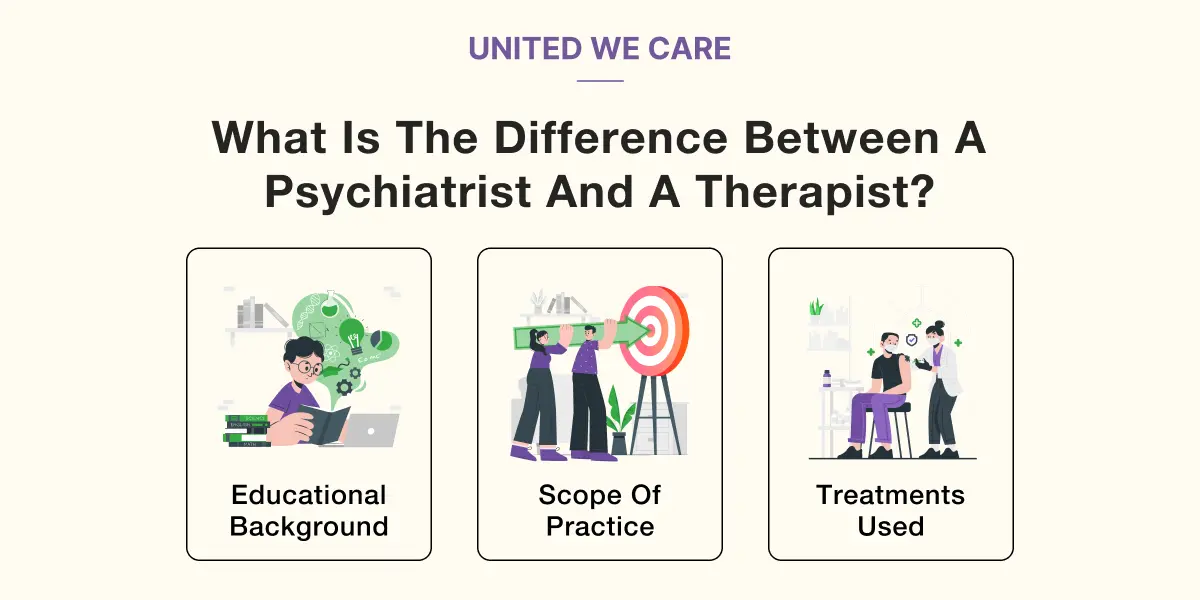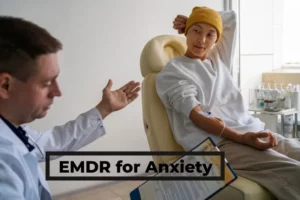Introduction
In our society, there’s an expectation on us as individuals to look, live, and be successful in a certain way that may only be achievable for some. Moreover, social media amplifies this feeling by feeding us idealized versions of life, distorting our perception of reality, and making us feel overwhelmed and like we’re not enough. However, the actual state of our reality is far from ideal, marked by multiple ongoing conflicts, increasing social inequality and economic uncertainty, and decreased quality of life. The cumulative impact of these sociocultural and environmental factors, combined with biological and hereditary factors, is progressively deteriorating our mental well-being. It is possible to improve and enhance our mental health by seeking professional help. Hence, it is important to understand the difference between a psychiatrist vs. therapist.
In this blog, we’ll discuss what the role of a psychiatrist is as well as that of a therapist, the key differences between the two, and how you can determine the right path of professional treatment for yourself.
Who is a Psychiatrist?
According to the American Psychiatric Association (APA), psychiatry is the branch of medicine that focuses on the diagnosis, treatment, and prevention of mental, emotional, and behavioral disorders. Hence, a psychiatrist is a medical doctor who specializes in mental health, including substance use disorders. [1]
The training to become a psychiatrist is quite intensive, ideally taking 8-12 years of education after high school, depending on the education guidelines and regulations of the country concerning psychiatry. An aspiring psychiatrist must complete medical school, obtain a license to practice medicine, and then complete a psychiatry residency to get a Doctor of Medicine (MD) degree to become a psychiatrist.
Is a Psychiatrist a Medical Doctor?
Psychiatrists conduct a range of medical, laboratory, and psychological tests to understand the relationship between mental and physical health illnesses. They also evaluate the family history and make diagnoses based on the Diagnostic and Statistical Manual of Mental Disorders (DSM-5). [2]
Because a psychiatrist is a medical doctor, they can prescribe medication for the treatment of mental health illnesses, as opposed to other mental health professionals without a medical degree who cannot do so. Along with medication, psychiatrists may also use psychotherapy and treatments such as electroconvulsive therapy (ECT), transcranial magnetic stimulation (TMS), vagus nerve stimulation (VNS), etc., depending on what the patient needs.
Who is a Therapist?
A therapist or psychotherapist is a trained and licensed mental health professional who can help one develop better emotional and cognitive skills to cope with life challenges or manage the symptoms of an underlying mental illness.
Therapists are required to have at least a master’s degree, if not a doctoral degree, in psychology, social work, or related fields. Following this, depending on the country’s education guidelines and regulations, they need to take an examination to obtain their license to practice as a therapist.
Role of a Therapist
For people with mental illnesses, therapy is often used in conjunction with medication. Hence, therapists also work closely with psychiatrists to help manage anxiety, personality, mood, eating, and substance use disorders. [3] For people without any serious mental conditions, therapists can also help with general emotional unrest, communication and relationship problems, major life transitions, and creating a stronger sense of self.
Therapists may be trained in and use therapies such as cognitive behavioral therapy (CBT), eye movement desensitization and reprocessing (EMDR) therapy, exposure therapy, interpersonal therapy, etc., as a treatment for mental health issues. [4]
Difference Between Psychiatrists vs. Therapists
As discussed above, a psychiatrist and therapist are different mental health professionals based on their educational backgrounds, scope of practice, and the treatments they use. [5] Let’s categorize the distinctions to get a better understanding of the differences.

Educational background
A psychiatrist possesses a medical degree, typically an M.D. in psychiatry degree. A therapist, on the other hand, holds an advanced degree (master’s or doctoral) in psychology or related fields.
Scope of practice
A psychiatrist focuses on diagnosing, treating, and preventing severe mental illnesses such as mood disorders, substance abuse, etc. While a therapist may work with a psychiatrist to manage the symptoms of these illnesses, they also work independently to address mental health concerns such as stress and anxiety, personal development, etc.
Treatments used
Even though they sometimes use psychotherapy as part of their treatment plan, the primary focus of a psychiatrist is to manage mental health illnesses using medication. Therapists, on the other hand, do not have the authority to prescribe medication. They use “talk therapy” to help clients create awareness and explore their thoughts and emotions to manage their mental health. They may use therapy approaches such as CBT, humanistic therapy, etc.
How Do You Know You Need a Psychiatrist or Therapist?
- If you’re experiencing severe overwhelm and distress if this is interfering significantly with your daily functioning, and if you have a known history of mental illness in your family, you may consider going to a psychiatrist.
- If you’ve recently started experiencing stress, anxiety, or mood imbalances, or if you’ve experienced loss or a major life change, or if you’re seeking assistance for a relationship or a specific problem, a therapist may be able to help you better.
- However, there are no hard and fast rules as to whom you should approach when looking for professional help.
- The best way to go about this is to find a professional, whether a psychiatrist or a therapist, that you’re comfortable opening up to.
- If you go to a psychiatrist and it turns out that you don’t require a serious intervention, they may treat you with therapy or refer you to a therapist.
- Similarly, suppose you go to a therapist, and your problems are indicative of an underlying mental disorder. In that case, they will refer you to a psychiatrist who will create a comprehensive treatment plan for you.
Conclusion
Due to current societal and environmental factors exacerbated by existing hereditary conditions, everyone must consider seeking professional help to manage their mental well-being. Hence, it is important to understand the kinds of professional mental help available, such as psychiatrists and therapists. A psychiatrist is a medical doctor who diagnoses and treats mental illness primarily through medication. A therapist is a trained and licensed mental health professional who is not authorized to prescribe medication but uses different kinds of psychotherapy as treatment. A psychiatrist and therapist often work together to develop the most effective treatment plan. If you’re unsure of who and where to seek professional mental health assistance from, book a session with one of our experts at United We Care, who can guide you in the right direction to manage your mental health.
References
[1] American Psychiatric Association, “What Is Psychiatry?” [Online]. Available: https://www.psychiatry.org/patients-families/what-is-psychiatry. Accessed: Jan. 15, 2023.
[2] B. M. Cohen, C. Ravichandran, D. Öngür, P. Q. Harris, and S. M. Babb, “Use of DSM-5 diagnoses vs. other clinical information by US academic-affiliated psychiatrists in assessing and treating psychotic disorders,” World Psychiatry, vol. 20, no. 3, pp. 447–448, 2021. [Online]. Available: https://doi.org/10.1002/wps.20903. Accessed: Jan. 15, 2023.
[3] American Psychiatric Association, “Psychotherapy,” [Online]. Available: https://www.psychiatry.org/patients-families/psychotherapy. Accessed: Jan. 15, 2023.
[4] National Alliance on Mental Illness, “Psychotherapy,” [Online]. Available: https://www.nami.org/About-Mental-Illness/Treatments/Psychotherapy. Accessed: Jan. 15, 2023.
[5] Southern New Hampshire University, “Difference Between a Psychologist and a Psychiatrist,” [Online]. Available: https://snhu.edu/about-us/newsroom/social-sciences/difference-between-a-psychologist-and-a-psychiatrist. Accessed: Jan. 15, 2023.










